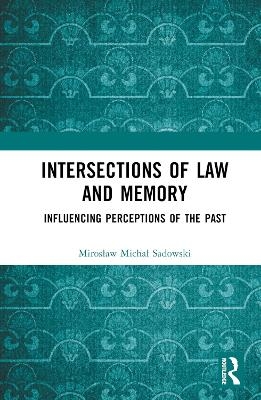
Intersections of Law and Memory
Routledge (Verlag)
978-1-032-61016-0 (ISBN)
How can law influence collective memory? What are the mechanisms law employs to influence social perceptions of the past? And how successful is law in its attempts to rewrite narratives about the past? As the field of memory studies has grown, this book takes a step back from established transitional justice narratives, returning to the core sociological, philosophical and legal theoretical issues that underpin this field. The book then goes on to propose a new approach to the relationship between law and collective memory based on a conception of ‘legal institutions of memory’. It then elaborates the functioning of such institutions through a range of examples – taken from Japan, Iraq, Brazil, Portugal, Rwanda and Poland – that move from the work of international tribunals and truth commissions to more explicit memory legislation. The book concludes with a general assessment of the contemporary intersections of law and memory, and their legal institutionalisation.
This book will be of interest to scholars with relevant interests in the sociology of law, legal theory and international law, as well as in sociology and politics.
Mirosław Michał Sadowski is Lecturer at the School of Law, University of Strathclyde in Glasgow, Scotland; Affiliated Researcher at the Centre for Global Studies, Aberta University in Lisbon, Portugal; Postdoctoral Fellow at CEBRAP – Brazilian Center of Analysis and Planning in São Paulo, Brazil; and Research Assistant at the Institute of Legal Sciences, Polish Academy of Sciences in Warsaw, Poland.
Introduction. Intersections of Law and Memory Take the Stage Part I. The Theory: Defining and Demarcating Law and Memory’s Intersections 1. Sociology, Memory and Law: From Halbwachs to Agents of Memory 2. Philosophy, Memory and Law: The French Four 3. Collective Memory, Law and Theory: From Human Rights and International Law to the Concept of Transitional Justice Part II. The Concept: Framing Law and Memory’s Intersections 4. Collective Memory and Law: Three Types of Institutions 5. The Hidden Power of Law and Memory Intersections: From Memory Politics to a Right to Memory Part III. The Practice: Reviewing Law and Memory’s Intersections 6. Placing Soft Legal Institutions of Memory within the New Framework 7. Placing Medium Legal Institutions of Memory within the New Framework 8. Placing Hard Legal Institutions of Memory within the New Framework. Conclusions. Intersections of Law and Memory: Remarks after the Inquiry
| Erscheinungsdatum | 14.03.2024 |
|---|---|
| Zusatzinfo | 1 Tables, black and white; 3 Line drawings, black and white; 3 Illustrations, black and white |
| Verlagsort | London |
| Sprache | englisch |
| Maße | 156 x 234 mm |
| Gewicht | 644 g |
| Themenwelt | Geisteswissenschaften ► Philosophie |
| Recht / Steuern ► Allgemeines / Lexika | |
| Recht / Steuern ► Arbeits- / Sozialrecht ► Sozialrecht | |
| Recht / Steuern ► EU / Internationales Recht | |
| Recht / Steuern ► Öffentliches Recht ► Völkerrecht | |
| Sozialwissenschaften ► Soziologie ► Allgemeines / Lexika | |
| ISBN-10 | 1-032-61016-6 / 1032610166 |
| ISBN-13 | 978-1-032-61016-0 / 9781032610160 |
| Zustand | Neuware |
| Informationen gemäß Produktsicherheitsverordnung (GPSR) | |
| Haben Sie eine Frage zum Produkt? |
aus dem Bereich


